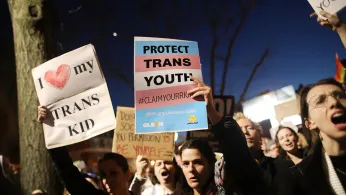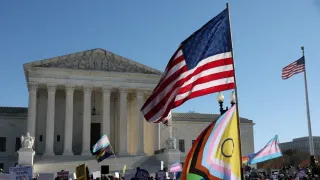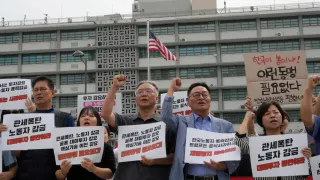
5 hours ago
U.S. Supreme Court Allows Transgender Student in South Carolina to Use Boys’ Restroom Amid Ongoing Legal Battle
READ TIME: 3 MIN.
In a pivotal development for transgender students’ rights, the U.S. Supreme Court on Wednesday permitted a transgender ninth-grade student—known in court documents as John Doe—to continue using the boys’ restroom at his South Carolina school while he pursues a legal challenge against a state law that prohibits transgender students from using facilities that align with his gender identity .
The unsigned order from the nation’s highest court denied South Carolina officials’ request to halt a ruling from the U.S. Court of Appeals for the Fourth Circuit, which had blocked enforcement of the state’s restroom restriction for Doe. The Supreme Court’s order emphasized that this move does not address the underlying legal arguments but is instead based on the standards for granting emergency relief .
The dispute centers on a provision in South Carolina’s 2024-25 and 2025-26 state budget bills that conditions school funding on compliance with a policy requiring students to use restrooms corresponding to the sex listed on their birth certificates . Doe, who is transgender and has been living as a boy, was suspended after using the boys’ restroom during the previous school year. Facing possible expulsion, Doe’s parents withdrew him from school, but he returned to in-person learning for the 2025-26 school year as the legal battle continued .
The family, represented by Public Justice’s Students’ Civil Rights Project, sought relief from the federal courts, arguing that the state’s policy violates Doe’s rights under federal law—including Title IX, which prohibits sex-based discrimination in federally funded education programs .
Advocates for transgender students celebrated the Supreme Court’s decision not to intervene at this stage. Alexandra Brodsky, litigation director for Public Justice’s Students’ Civil Rights Project, stated, “Today’s decision from the Supreme Court reaffirms what we all know to be true: Contrary to South Carolina’s insistence, trans students are not emergencies. They are not threats. They are young people looking to learn and grow at school, despite the state-mandated hostility they too often face. We are so thrilled that our client will continue to be able to use boys’ restrooms while his appeal continues, and hope today’s decision will provide hope to other trans students and their families during these difficult times.”
Conversely, the state of South Carolina argued that its policy ensures privacy and safety for all students and requested that the Supreme Court allow enforcement pending the outcome of ongoing litigation . Three justices—Clarence Thomas, Samuel Alito, and Neil Gorsuch—indicated their dissent, stating they would have granted the state’s request, but no dissenting opinion was issued .
The Supreme Court’s order arrives during a period of escalating national debate over the rights of transgender students in schools. Across the United States, numerous states have enacted or proposed legislation restricting transgender students’ access to restrooms, participation in sports, and recognition of their gender identity in school records .
Legal experts note that while the Supreme Court’s action does not resolve the underlying constitutional and civil rights questions, it signals the importance of protecting students’ access to facilities that correspond with their gender identity during protracted legal battles . The high court is expected to hear arguments in the coming term on other cases involving transgender students’ participation in school athletics, indicating that further Supreme Court decisions on queer student rights are forthcoming .
For many transgender students, restroom access is about more than convenience—it is linked to safety, dignity, and the ability to fully participate in school life. LGBTQ+ advocacy groups argue that restrictive restroom policies contribute to stigmatization, absenteeism, and negative mental health outcomes .
The Supreme Court’s order provides temporary relief for Doe and a symbolic victory for transgender students facing similar challenges. Still, the case’s ultimate outcome remains uncertain, as the legal fight over South Carolina’s law continues in lower federal courts .






